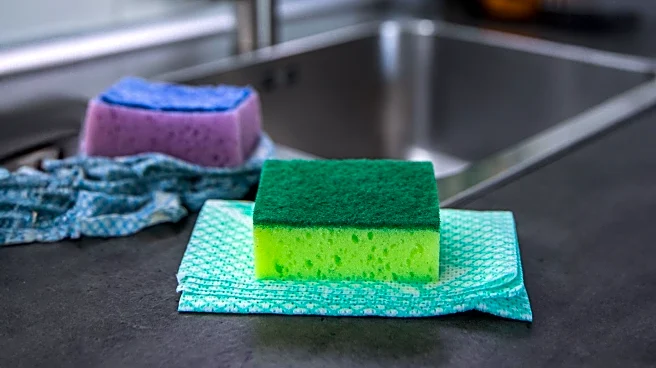What's Happening?
Recent research has highlighted the potential health risks associated with microplastics released from common kitchen sponges. These sponges, typically made from synthetic polymers such as polyester and
polyurethane, can shed microplastics due to friction and exposure to heat. Experts, including Paul Anastas from Yale's School of the Environment and Tracey Woodruff from the University of California San Francisco, have noted that these microplastics can contaminate kitchen surfaces and utensils, posing health risks such as cancer and hormone disruption. To mitigate these risks, experts recommend using plastic-free alternatives made from plant-based materials like cellulose and cotton, which are less likely to release harmful chemicals.
Why It's Important?
The presence of microplastics in everyday kitchen items raises significant health concerns, as these particles have been found in various parts of the human body, including the brain and blood. The shift towards plastic-free sponges is not only beneficial for personal health but also for the environment, as these alternatives are typically compostable. This move could reduce the prevalence of microplastics in the ecosystem, which are known to persist due to their strong molecular bonds. Consumers stand to benefit from reduced exposure to toxic chemicals, while manufacturers of plastic-free products may see increased demand as awareness of these issues grows.
What's Next?
As awareness of microplastic pollution increases, it is likely that more consumers will seek out plastic-free kitchen products. This could lead to a broader market shift towards sustainable and health-conscious alternatives. Manufacturers may respond by expanding their product lines to include more eco-friendly options, potentially driving innovation in materials science. Additionally, regulatory bodies might consider implementing stricter guidelines on the use of synthetic polymers in consumer products to protect public health.
Beyond the Headlines
The movement towards plastic-free kitchen products reflects a larger trend in consumer behavior favoring sustainability and health. This shift could have long-term implications for industries reliant on synthetic materials, prompting a reevaluation of manufacturing practices. Ethical considerations regarding environmental impact and consumer safety are likely to become more prominent in product development and marketing strategies.











